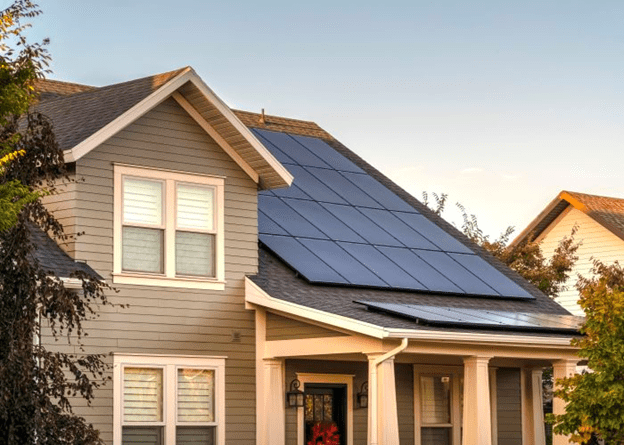
Solar panels will certainly raise the value of your home in New Jersey. Compared to other states, New Jersey’s electricity rates are much higher. When you go solar in New Jersey, you have more control over your utility bills. You may also generate and store solar energy to safeguard your home from power disruptions and lower your carbon footprint. There are also several financial incentives available to assist you in leasing or purchasing a power storage system and new solar installations.
You may, however, question if a solar investment is worthwhile. After all, most property owners pay thousands of dollars for solar, even with tax rebates and other incentives. Consider the following tips for the expenses and benefits of solar in New Jersey. Here are some things to think about when purchasing solar panels and wondering, “Is solar worth it in NJ?”:
- Most properties in the state can benefit from solar energy. If your roof is small, you may want to reconsider going solar. If that’s the case, it might not have enough room for all the solar panels you’ll need to meet your energy needs. Also, make sure the roof gets enough sunlight for optimal solar production.
- Also, keep in mind that performing roof repairs usually necessitates disassembling solar panel arrays. As a result, scheduling necessary repairs before installing solar panels is critical. Before installing solar panels, a homeowner may even consider full-scale reroofing.
- Finally, consider whether your energy use justifies the expense of solar panels. If you don’t have many gadgets or rarely use home appliances, the cost savings from solar panels might not be worth it. On the other hand, solar panel arrays are a great investment for most property owners. Solar has so many benefits that it’s a terrific decision for area property owners; even if you only redeem a few hundred dollars per year, it will be worthwhile.
Does Solar Energy Work in New Jersey?
Solar energy is effective everywhere there is sunlight. Getting your panels as much sun exposure as possible is crucial to generating enough energy to make your investment worthwhile. Your solar panel installation, for example, may recommend pruning overgrown tree branches.
It’s also critical to hire a reputable installer who will slant the panels for optimal solar exposure. A property owner should keep the panels free of debris all year. Many solar panel owners invest in specialist brushes with telescopic handles to sweep material off the panels. Furthermore, occasionally wiping them down with a yard hose is typically adequate!
Keep in mind that the amount of electricity produced by solar panels varies during the year. Your panels will produce less electricity on gloomy or overcast days than on bright days. On the other hand, most solar panel owners find that their panels generate enough electricity to make their investment profitable.
Does New Jersey Have a Solar Tax Credit?
Solar panels are eligible for a property tax exemption in New Jersey. What exactly does this imply? You are not required to pay taxes on the increased value, so you can enjoy the greater equity without incurring a tax burden. The following are the NJ solar tax credits:
- Federal Solar Investment Tax Credit (ITC)
By December 31, 2022, purchased home solar systems are eligible for a 26 percent federal solar tax credit.
- Solar Renewable Energy Credits (SRECs)
Compensation for each kilowatt-hour (kWh) that the system generates (Varies by market value.)
- Solar Investment Property Tax Exemption
The increased home value from the rooftop solar system qualifies for a property tax exemption.
- Solar Panel System Sales Tax Exemption
State sales tax exemption for household solar systems of 6.625 percent. In New Jersey, numerous benefits to going solar make it a no-brainer.
Can You Sell Electricity Back to the Grid in NJ?
In New Jersey, the quick answer is yes; you can sell electricity back to the grid. Selling solar energy back to local utility providers is known as net metering. What is the mechanism behind this?
First and foremost, solar-powered properties remain connected to local power companies and use that electricity for appliances and devices. Second, the meter on the property records the power usage so that the utility company can generate your bill.
Your solar array is then connected to this wire and your property’s meter by a professional. Finally, the meter travels backward when the panels generate energy and feed it back to the grid. As a result, any power generated by those panels is credited to you and paid back to your utility company.
Consequently, solar-paneled properties continue to get bills from utility or power companies. That law, however, includes a credit for the energy generated by solar panels. As a result, your power cost will be considerably reduced or even eliminated when you install solar panels!
Solar panel systems are free from property taxes in New Jersey. The solar system’s assessed value is exempt from the homeowner’s property taxes under the Property Tax Exemption for Renewable Energy Systems.
How Much Do Solar Panels Cost on Average in NJ?
According to Forbes Advisor, solar panels cost on average $16,000 or between $3,500 and $35,000 in New Jersey, depending on panel quality and quantity. For many homeowners, federal tax credits for 2022 and 2023 can reduce that cost by more than 20%.
Property owners should also consider any interest charges associated with leasing or financing those panels. These can add several hundred dollars or more to your total price.
On the other hand, solar panels are exempt from state sales tax. As a result, you won’t need to factor in additional taxes when calculating the cost of solar panel installation. This exemption may lower the cost of solar for local property owners.
Solar is a wonderful option for any home in New Jersey. Solar panels provide pollution-free electricity without the need for gas, emissions, or other contaminants. Additionally, a solar panel array can help you save money on your energy expenses.





